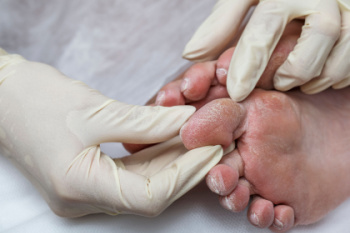 Diabetes can lead to various foot problems caused by poor blood circulation and nerve damage, known as diabetic neuropathy. This condition reduces the ability to feel pain or temperature changes, increasing the risk of unnoticed injuries, blisters, or sores. Poor circulation also slows down the healing process, making minor foot issues more likely to develop into serious infections or ulcers. A routine foot care plan is essential for individuals with diabetes. This includes daily inspection of the feet for cuts, blisters, redness, or swelling, and keeping the feet clean and moisturized to prevent dry, cracked skin. Wearing well-fitting shoes and changing socks daily can help to prevent irritation and injury. Regularly trimming toenails and avoiding walking barefoot are also important preventive measures. If foot problems arise, such as persistent pain, swelling, or wounds that do not heal, it is strongly suggested that you visit a podiatrist immediately. This foot doctor can provide specialized care, help prevent complications, and develop a comprehensive foot care strategy to maintain foot health.
Diabetes can lead to various foot problems caused by poor blood circulation and nerve damage, known as diabetic neuropathy. This condition reduces the ability to feel pain or temperature changes, increasing the risk of unnoticed injuries, blisters, or sores. Poor circulation also slows down the healing process, making minor foot issues more likely to develop into serious infections or ulcers. A routine foot care plan is essential for individuals with diabetes. This includes daily inspection of the feet for cuts, blisters, redness, or swelling, and keeping the feet clean and moisturized to prevent dry, cracked skin. Wearing well-fitting shoes and changing socks daily can help to prevent irritation and injury. Regularly trimming toenails and avoiding walking barefoot are also important preventive measures. If foot problems arise, such as persistent pain, swelling, or wounds that do not heal, it is strongly suggested that you visit a podiatrist immediately. This foot doctor can provide specialized care, help prevent complications, and develop a comprehensive foot care strategy to maintain foot health.
Diabetic foot care is important in preventing foot ailments such as ulcers. If you are suffering from diabetes or have any other concerns about your feet, contact Brent Harwood, DPM from Southeast Podiatry. Our doctor can provide the care you need to keep you pain-free and on your feet.
Diabetic Foot Care
Diabetes affects millions of people every year. The condition can damage blood vessels in many parts of the body, especially the feet. Because of this, taking care of your feet is essential if you have diabetes, and having a podiatrist help monitor your foot health is highly recommended.
The Importance of Caring for Your Feet
Patients with diabetes should have their doctor monitor their blood levels, as blood sugar levels play such a huge role in diabetic care. Monitoring these levels on a regular basis is highly advised.
It is always best to inform your healthcare professional of any concerns you may have regarding your feet, especially for diabetic patients. Early treatment and routine foot examinations are keys to maintaining proper health, especially because severe complications can arise if proper treatment is not applied.
If you have any questions please feel free to contact one of our offices located in Fairhope, Brewton, and Atmore, AL . We offer the newest diagnostic and treatment technologies for all your foot and ankle needs.
Diabetes can cause two problems that can potentially affect the feet: Diabetic neuropathy and Peripheral Vascular Disease. Diabetic neuropathy occurs when nerves in your legs and feet become damaged, which prevents you from feeling heat, cold, or pain. The problem with diabetic neuropathy is that a cut or sore on the foot may go unnoticed and the cut may eventually become infected. This condition is also a main cause of foot ulcers. Additionally, Peripheral vascular disease also affects blood flow in the body. Poor blood flow will cause sores and cuts to take longer to heal. Infections that don’t heal do to poor blood flow can potentially cause ulcers or gangrene.
There are certain foot problems that are more commonly found in people with diabetes such as Athlete’s foot, calluses, corns, blisters, bunions, foot ulcers, ingrown toenails, and plantar warts. These conditions can lead to infection and serious complications such as amputation. Fortunately, proper foot care can help prevent these foot problems before they progress into more serious complications.
Each day you should wash your feet in warm water with a mild soap. When you finish washing your feet, dry them carefully especially between your toes. You should also perform daily foot inspections to ensure you don’t have any redness, blisters, or calluses. Furthermore, if you are diabetic, you should always wear closed-toed shoes or slippers to protect your feet. Practicing these tips will help ensure that your feet are kept healthy and away from infection.
If you have diabetes, contact your podiatrist if you have any of the following symptoms on your feet: changes in skin color, corns or calluses, open sores that are slow to heal, unusual and persistent odor, or changes in skin temperature. Your podiatrist will do a thorough examination of your feet to help treat these problematic conditions.